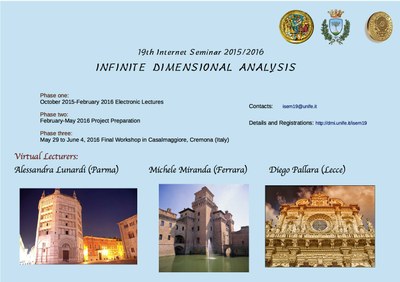19th Internet Seminar: Infinite Dimensional Analysis
 |
Department of Mathematics and Compuer Science University of Parma |  |
Department of Mathematics and Compuer Science University of Ferrara |  |
Department of Mathematics and Physics "Ennio De Giorgi" University of Salento |
|---|
The I-Sem is a well-established series of courses in the field of Mathematical Analysis.For past editions, see
http://www.math.kit.edu/iana3/seite/isem/
It introduces master, Ph.D. students and postdocs to subjects related to functional analysis and evolution equations.
As usual, the course consists of three phases.
- Phase 1 (October-February) The organisers provide a weekly lecture via the ISem website. The participants are expected to study the lecture notes, to solve the proposed problems, to post their remarks and questions in the website, and to post the solutions of the problems, in turn. Participants belonging to the same institution are encouraged to collaborate, possibly under the supervision of a senior local coordinator.
- Phase 2 (February-May) The participants form small international groups to work on various projects which supplement the theory of Phase 1 and provide some applications. Each group is coordinated by a senior mathematician who provides bibliographical material and help.
- Phase 3 (30 May-4 June, 2016) A final one-week workshop will be held at Istituto Santa Chiara, Casalmaggiore, Cremona (Italy). There the teams will present their projects and some additional lectures will be delivered by leading experts.
The virtual lecturers are
and the topic is "Infinite dimensional analysis". More precisely, we consider separable infinite dimensional Banach spaces endowed with Gaussian measures and we describe their main properties; in particular we are interested in integration by parts formulae that allow the definition of gradient and divergence operators. Once these tools are introduced, we study Sobolev spaces. In the context of Gaussian analysis the role of the Laplacian (\(\Delta={\rm div\, grad}\)) is played by the Ornstein-Uhlenbeck operator. We study the realisation of the Ornstein-Uhlenbeck operator and of the Ornstein-Uhlenbeck semigroup in spaces of continuous functions and in \(L^p\) spaces. In particular, for \(p=2\) the Ornstein-Uhlenbeck operator is self-adjoint and we show that there exists an orthogonal basis consisting of explicit eigenfunctions (the Hermite polynomials) that give raise to the "Wiener Chaos Decomposition". You can download a pdf versione of the program : program.pdf
We expect from the participants basic knowledge in functional analysis, foundations of Hilbert spaces, and some familiarity with partial differential equations and measure theory. Knowledge of probability theory and stochastic analysis may be of help but it is not essential.
Participants should register filling the Registration form in this webpage. Registration is free. You can find here the list of registered users.
Contact and Info:
We still have 25 paper copies of the poster; if you wish to receive a copy, please send your request and the address to michele.miranda@unife.it



